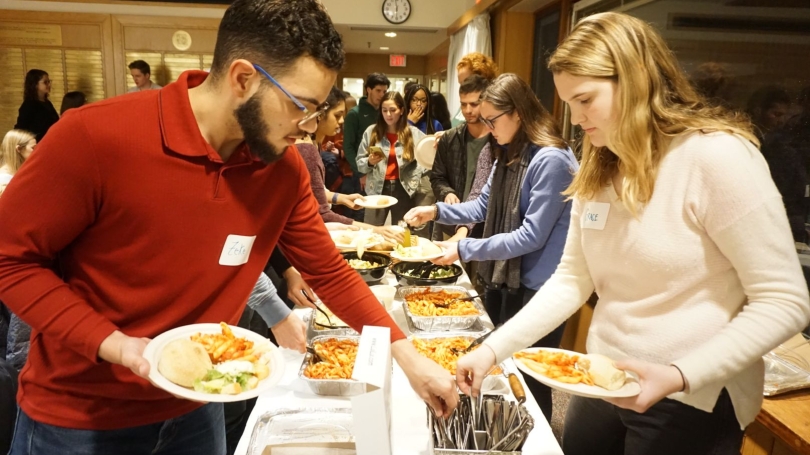
- Public Policy
- Leadership
- Funding
- News & Events
- About the Center
Back to Top Nav
Back to Top Nav
Back to Top Nav
Back to Top Nav
By Eliza Gallant of The Dartmouth
The Rockefeller Center for Public Policy recently transitioned to using only metal cutlery at all of its events in order to reduce its plastic usage. With a large portion of meals at dining locations and catered events using disposable plastic cutlery, the transition to reusable cutlery marks a significant effort to reduce plastic waste on campus.
This initiative was started last fall by Ellie Curtis ’22 as a challenge for the Rockefeller Center’s Management and Leadership Development Program.
After attending her first MLDP dinner, Curtis said she realized how much plastic silverware was used at the event and chose to expand her personal goal of reducing plastic cutlery usage to the Rockefeller Center. She pitched the idea of purchasing or borrowing metal cutlery for events to Rockefeller Center program officer Robin Frye and then got in touch with assistant director Bob Coates.
“I have always called myself an environmentalist, but I hadn’t always practiced what I preached,” Curtis said. “I thought that starting with reducing my plastic silverware usage would be a good way to start.”
Curtis said that she found replacing plastic cutlery with metal more logistically challenging than she had originally thought. The Rockefeller Center did not have a dishwasher, and according to Curtis, to pass health and safety codes, the Center would have to work with other organizations on campus. Curtis said she then reached out to Class of 1953 Commons dining manager Brandon Crosby for help with the initiative.
“Brandon had a lot of great ideas and was incredibly supportive of the project,” Curtis said. “I found that if you take the initiative, other people will go along with you and match your energy on the problem you are trying to tackle.”
Crosby said that he realized that ’53 Commons was storing cutlery that had been retired. He added that he offered to donate 60 to 70 extra sets of silverware to the Rockefeller Center and to clean the silverware after events. To enact Curtis’ initiative, the Rockefeller Center had to buy a few silverware carriers, which would be used to bring sets of silverware to ’53 Commons to be cleaned and returned to the Center after events.
This effort is not the first undertaken by a College student to reduce plastic waste. Dartmouth Dining Services began using “Green2Go” containers in 2017 to replace disposable take out containers. While the containers are used at both ’53 Commons and the Courtyard Cafe and have replaced the approximately 1,000 disposable containers DDS used before the program was enacted — the containers have presented their own challenges.
According to Crosby, one of the biggest issues with the Green2Go program is that students fail to return the containers. With that issue in mind, Crosby expressed concern with similar issues for the metal cutlery.
“The issue with offering metal cutlery to-go would be that students wouldn’t always return it and it is very expensive,” Crosby said.
Crosby noted that while DDS sells sporks for students to use instead of disposable cutlery, few students have embraced the option.
Curtis said that she believes this initiative will work well for other centers and organizations on campus that host events with catered food.
Like Curtis, Sustainability Corps program manager Marcus Welker expressed concern over plastic cutlery usage on campus. According to Welker, plastic cutlery is difficult to recycle because of its size.
“A material recovery facility is a huge recycling sorting machine that is able to sort different materials from one another,” Welker said. “However, plastic cutlery is difficult to sort because it is too small, and so it will fall out of the machine and will be sent to the landfill.”
Welker said that one of the biggest issues with sustainability at the College is the misaligned incentives with recycling. He noted that those who purchase plastic silverware on campus in bulk are not the ones who pay for Dartmouth’s waste management.
“A big issue is that the group that is buying the materials doesn’t also pay for the waste to be managed,” Welker said. “There is no direct incentive for dining to reduce the amount of plastic silverware. There are a lot of systems in sustainability that function like this with disconnects between behavior and outcome.”
Sustainability Corps waste and materials Team member Lindsey Reitinger ’20 said that she believes students can make more sustainable choices; however, they often do not out of convenience.
“A small amount of inconvenience can end up being a big barrier,” Reitinger said. “If every student on campus uses three pieces of disposable silverware a day, that is an incredible amount of waste that could be reduced.”